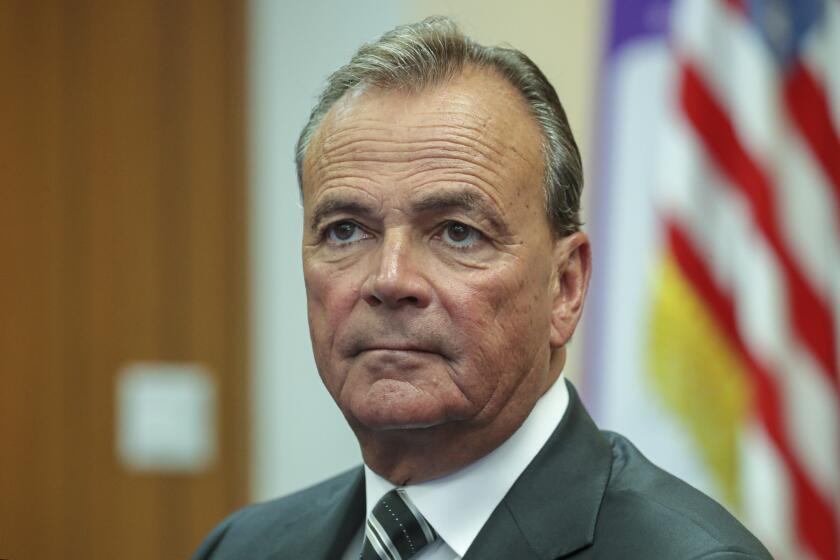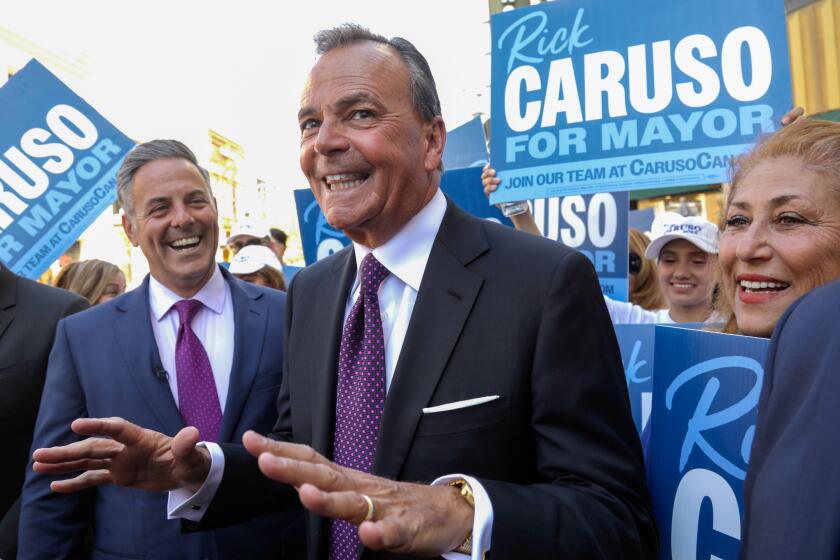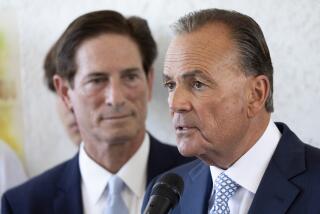News Analysis: Rick Caruso was a Republican 3 years ago. Will voters care?
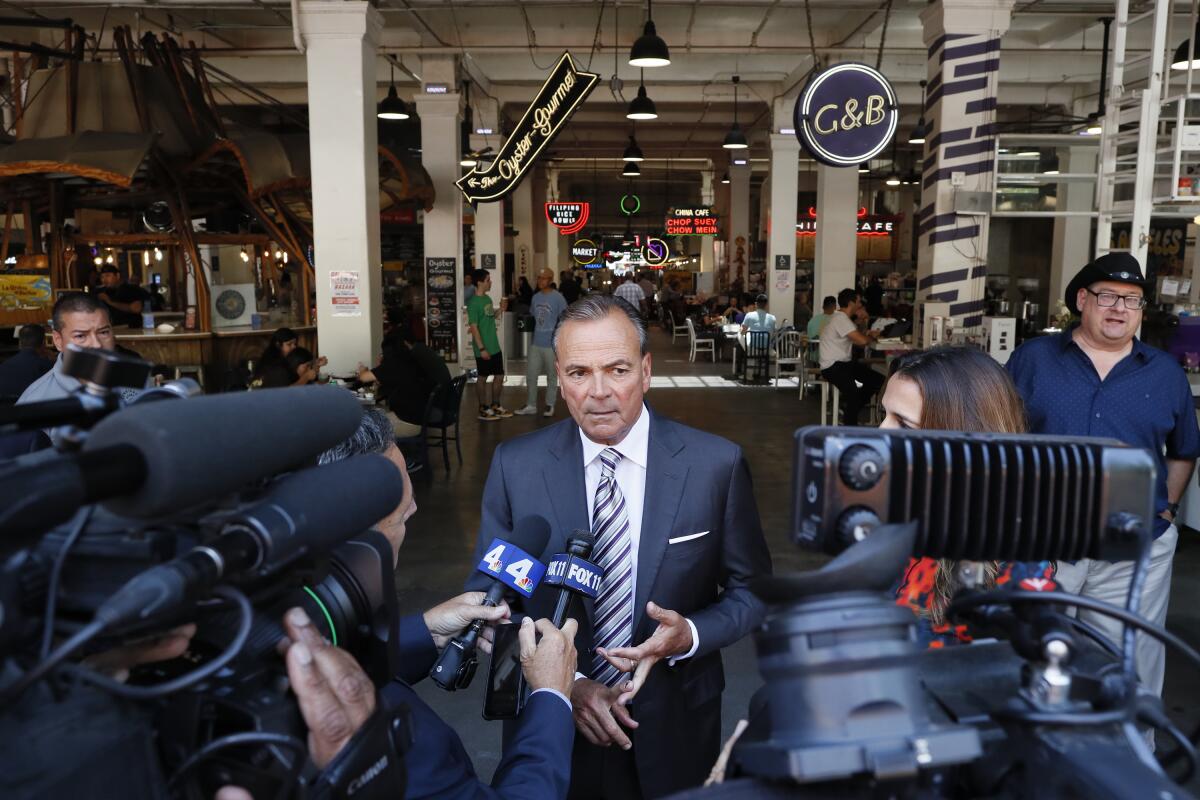
- Share via
With less than a week until the Los Angeles mayoral primary, Rick Caruso’s political evolution from Republican to Democrat still remains opaque to many voters in the overwhelmingly liberal city he hopes to lead.
It’s widely known that Caruso, who was a Republican for much of his life, switched his party registration to “decline to state” in 2011 while mulling over a run in the city’s 2013 mayoral election. It’s also widely known that Caruso changed his party affiliation to Democratic in late January of this year, less than a month before filing to run in the 2022 mayoral election.
Less attention has been paid to the fact that Caruso re-registered as a Republican in March 2016, according to records from the Los Angeles County registrar-recorder/county clerk’s office. Caruso kept his Republican Party affiliation until mid-November 2019, when he changed his registration back to “no party preference,” according to county records.
All told, the real estate developer has changed his party registration four times in the last 11 years, shifting twice between Republican and no party preference before re-registering as a Democrat about four months ago.
“I’m a Democrat, and I’m proud to be a Democrat,” Caruso said when asked Tuesday about his prior changes in voter registration. “What fascinates me is that we’re even having this conversation because the electorate, the voters in the city don’t care about this. What the voters of the city care about is crime and homelessness and corruption.”
Caruso could be right about that. In a race where frustration is the prevailing sentiment and issues of homelessness and public safety have dominated nearly every discussion, it’s unclear how much voters care about a candidate’s political development — even if most know little about it.
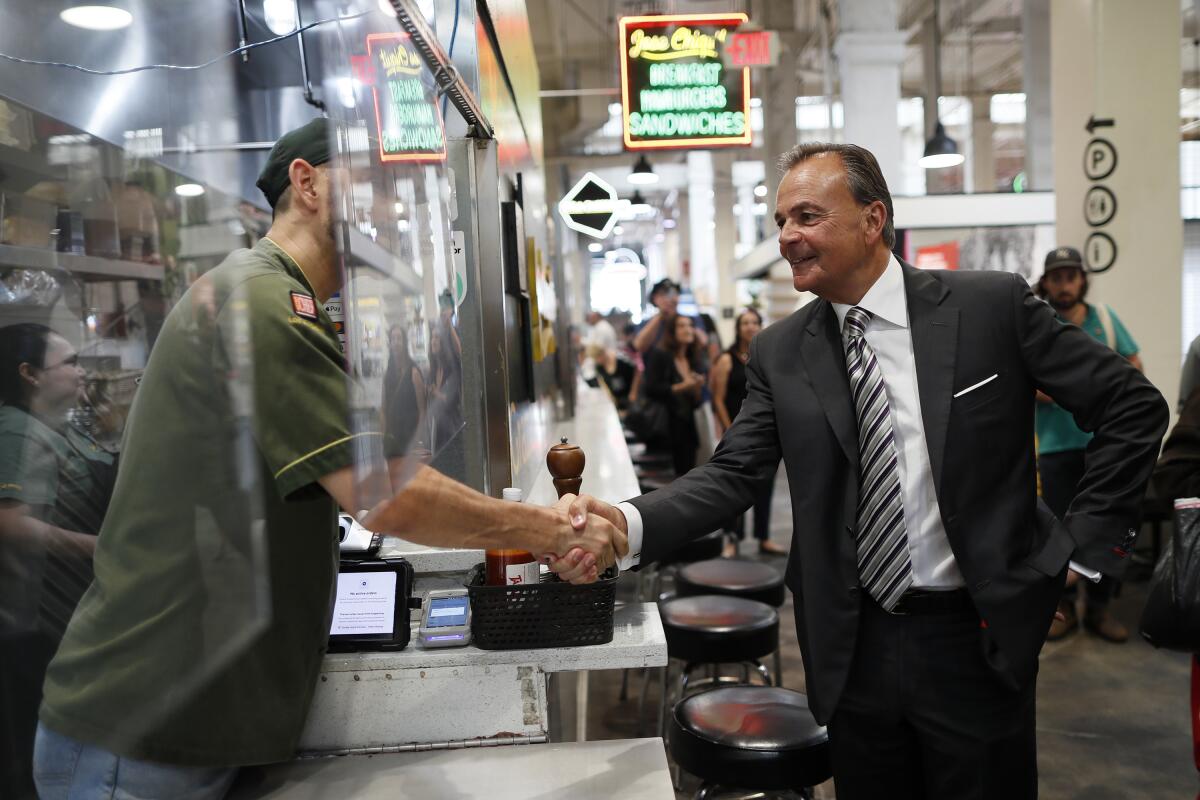
The candidate’s GOP past has been the subject of frequent fire from his rivals and their supporters. Caruso has typically dismissed criticism and most questions about his registration history.
Voters seeking to better understand his zigzagging political transformation will find few answers in his $25-million barrage of advertisements. But Caruso offered more candor about his evolving political thinking during a meeting with an influential homeowners group in March.
Speaking to the Sherman Oaks Homeowners Assn. over Zoom, Caruso did not correct the interviewer’s mistaken impression that he had remained a no-party-preference voter from 2011 until registering as a Democrat in 2022.
Get the lowdown on L.A. politics
Sign up for our L.A. City Hall newsletter to get weekly insights, scoops and analysis.
You may occasionally receive promotional content from the Los Angeles Times.
But he did share insight into his worldview with the relatively small audience, saying he became an independent because he didn’t like ideology.
“When I was a Republican, I was a centrist. When I was an independent, I was a centrist. As a Democrat, I’m a centrist,” Caruso said, describing himself as “fiscally conservative but socially accepting of how people want to live their lives.”
He didn’t want to return to the Republican Party, he said, because he worried about the direction it was heading. Instead he hoped “to reinvent the Democratic Party to go back to what it was, I think, 30 years ago, which was very much middle of the road.”
Whether Los Angeles voters who veered left on issues of criminal justice reform and backed Sen. Bernie Sanders (I-Vt.) in recent years want to see the Democratic Party swing toward the center remains an open question.
The billionaire developer has said little about global warming.
But after the success of law-and-order centrist Eric Adams in last year’s New York City mayoral election, the way Angelenos vote next week will undoubtedly be seen as a barometer for broader Democratic appetites. A runoff election with the top two vote-getters will be held in November unless a candidate wins outright with more than 50% of the vote in the primary.
Caruso first switched his registration from Republican to no party preference in late November 2011. He was considering a run for mayor at the time.
Records show that he re-registered as a Republican in March 2016.
Shortly after changing his registration in 2016, Caruso told Los Angeles Magazine that he had made the switch so that he could vote for John Kasich in the Republican presidential primary that year. Caruso served as Kasich’s California co-chair and was outspoken about his dislike for then-candidate Donald Trump.
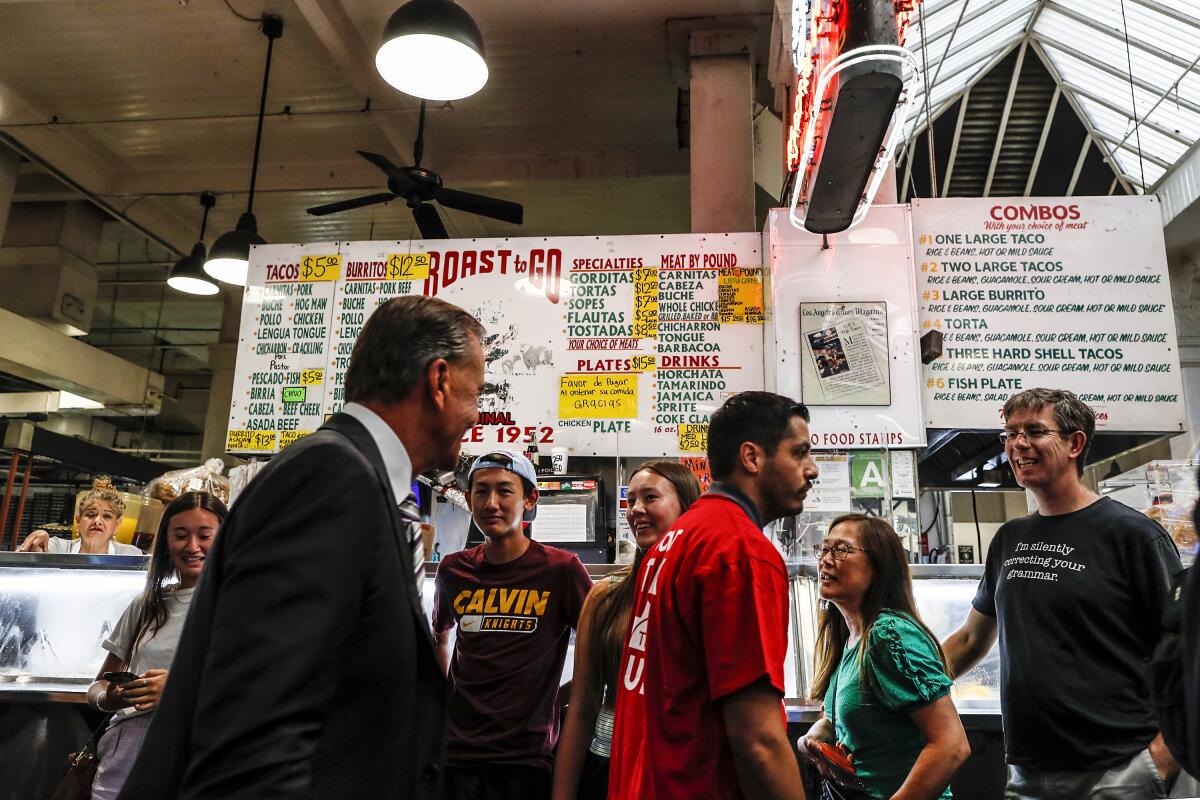
Kasich dropped out of the race in May 2016, and Caruso did not vote in that year’s primary, according to county records. Caruso spokesperson Peter Ragone said Caruso did not vote for Trump in 2016 but declined to say whether he voted for another candidate in the November 2016 presidential race.
His campaign also declined to answer questions about what elements of the Republican Party Caruso identified with in 2016 beyond his support of Kasich, or why Caruso chose to change his registration away from Republican in late 2019, nearly three years into Trump’s presidency.
Darry Sragow, a veteran Democratic strategist and publisher of the nonpartisan California Target Book, thought that Caruso’s repeated changes in party affiliation could raise questions for voters.
Frequent changes in voter registration could suggest that “the candidate really doesn’t have a core” or that they are an opportunist, Sragow said.
Despite L.A.’s global image as a place of glamour and glitz, city voters have tended to select mayors who have done time on the government payroll.
He categorized the matter as a data point for voters — hardly fatal, but something that could resonate negatively if they believe it’s part of a larger picture.
When asked about Caruso’s registration history, Caruso’s opponents and their supporters were quick to try to paint such a picture, tying the changes in registration to Caruso’s prior support of Republican politicians.
“Nothing is certain except death, taxes and Rick Caruso is a Republican. His track record speaks for itself: from serving as Trump’s economic advisor, to backing antiabortion and pro-NRA politicians like Mitch McConnell,” fellow mayoral candidate and L.A. City Councilmember Kevin de León said.
Morgan Miller, chair of a political action committee promoting Rep. Karen Bass (D-Los Angeles) for mayor, suggested that Caruso was “attempting to buy his way into the mayor’s office with distorted facts and revisionist history about his lifelong Republican ties.”
Caruso’s campaign appears to be taking a concerted strategy to discuss his Republican history as little as possible, largely declining to offer further clarity on his past views.
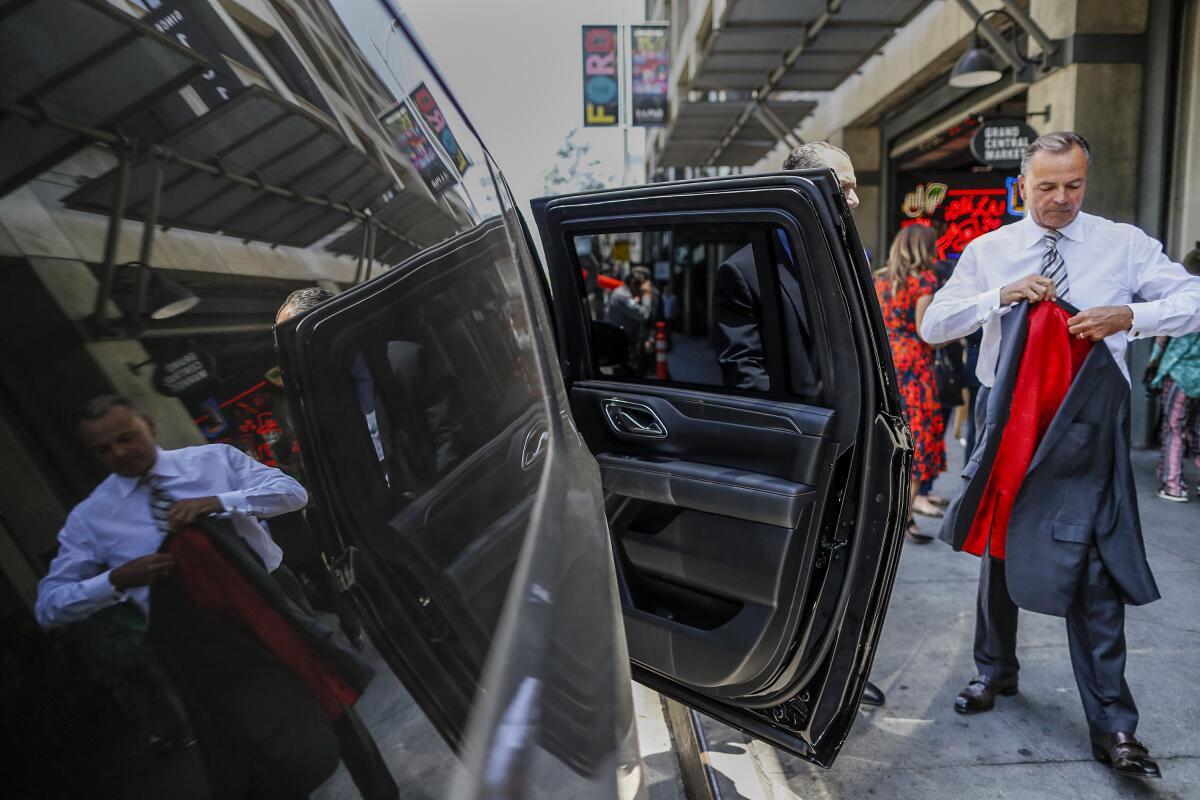
They took a similar tack when abortion became a campaign issue early last month after a draft opinion appeared to show that the Supreme Court is poised to overturn Roe vs. Wade.
Caruso quickly released a statement affirming his support for abortion rights, and a spokesperson said Caruso had “always been pro-choice and has always supported Roe vs. Wade.”
A 2007 interview with Los Angeles Magazine in which Caruso is described as saying “he opposes abortion in most cases but would support some stem cell research” seemingly contradicts that statement, but his campaign declined to comment on the article.
Caruso has given extensive financial support to Republican politicians, including more than $240,000 to a super PAC supporting Kasich’s presidential run in 2016; $100,000 to a PAC supporting President George W. Bush’s reelection in 2004; and $50,000 to a PAC supporting Rep. Kevin McCarthy (R-Bakersfield) in 2017.
He has donated more frequently to Democratic politicians in recent years, including contributions to the congressional campaign of his now-opponent Bass in 2010 and 2011.
Times staff writer Dakota Smith contributed to this report.
More to Read
Sign up for Essential California
The most important California stories and recommendations in your inbox every morning.
You may occasionally receive promotional content from the Los Angeles Times.
